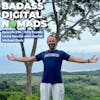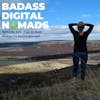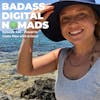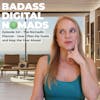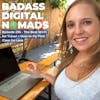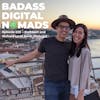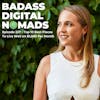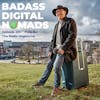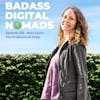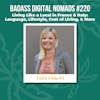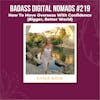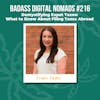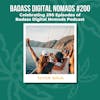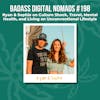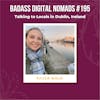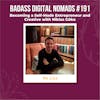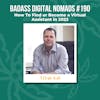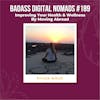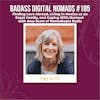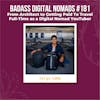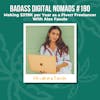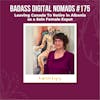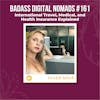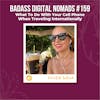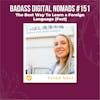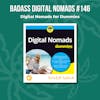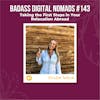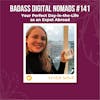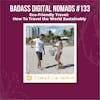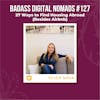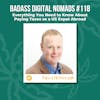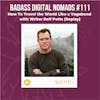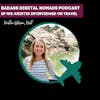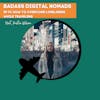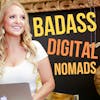How To Be Great and Live Your Best Life With Steph Smith io
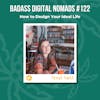
How can you advance in your career and have freedom at the same time? What are some practical ways to design your ideal life? Kristin speaks with Steph Smith from the popular digital nomad and remote work blog, StephSmith.io, to share her tips on lifestyle design, productivity, long-term travel, nomadic relationships, and more.
How can you advance in your career and have freedom at the same time? What are some practical ways to design your ideal life? Kristin speaks with Steph Smith from the popular digital nomad and remote work blog, StephSmith.io, to share her tips on lifestyle design, productivity, long-term travel, nomadic relationships, and more.
Steph is a remote growth marketer, writer, and indie maker. She is also a self-taught developer that has built multiple projects, including some that have topped Product Hunt, leading to a nomination for Maker of the Year in 2018. Steph also has a personal blog that has been read by over half a million people, touching on topics including remote work, productivity, and tech. Most recently, she wrote a book, Doing Content Right, that has sold over 3,000 copies.
In episode 122 of Badass Digital Nomads, Kristin and Steph talk about the key elements of designing and living your best life, from optimizing your career to the little things that boost your happiness. Steph tells her story of how she became a digital nomad and entrepreneur, highlighting the mindset and top skills you need to follow a non-traditional life path.
Wise beyond her years, Steph shares some of the lessons she’s learned from traveling the world and living amongst other cultures while continuing her education and growth as a professional.
Ready to start designing your ideal life? Tune in to join the movement!
RESOURCES
► Open a Wise Borderless Account with Wise (formerly Transferwise)
► Get Travel Medical Insurance with SafetyWing
► Want to make money online with freelancing? Use code QUITYOURJOB for $100 off Kristin's online course, Freelance to Freedom.
► Check out Kristin's Podcast Equipment on Amazon.
EPISODE 122 TOPICS DISCUSSED:
- Dating as a digital nomad.
- Steph’s strategy for designing her ideal life.
- The lifecycle of a digital nomad.
- Jobs that you can work remotely while traveling.
- Adjusting to digital nomadism & The mindset required to get a remote job.
- The power of doing your own thing and taking non-traditional life paths.
- Applying the Explore-Exploit Framework to life.
- Lessons learned from experiencing burnout from working and traveling too much.
- How Steph developed skills, like coding, while traveling & The projects she’s working on now.
- Top skills you should learn if you want to work remotely in 2021.
- How to approach continuous learning and growth in an enjoyable way.
QUESTIONS ANSWERED:
- What happened in the moment where you realized that you wanted to quit your 9-5 job?
- How did you get the courage to quit your traditional job and what did you do next?
- How did you find a remote job?
- What were your first few months like after starting to work remotely abroad?
- Where are some of the places you chose to work remotely and why?
- What inspired you and gave you the courage to apply for a location independent job?
- Why did you start a blog and what have you learned through writing online?
- How do you balance a full-time remote job with your side hustle?
- How has traveling changed you?
- What are some of the favorite places you've been?
- How does one begin with "designing their life?"
- How do you avoid burnout as a digital nomad and remote worker?
- What do you think is the best work/travel strategy for the future now that you have experience in a location-independent lifestyle?
- And much more!
RESOURCES:
Videos:
Books:
- Doing Content Right by Steph Smith
- Steph’s favorite books
- Mastery by Robert Greene
- Find more of Kristin's recommended books on Amazon
- Traveling with Kristin's Book Club
Podcasts:
- From Corporate Lawyer to Full-Time Nomad with Kevin Martin from 30 and a Wake Up
- The Shocking Truth About How US Expats Vote
- Shit You Don’t Learn in School (Steph's new show)
Articles:
- It’s Time for Companies to Embrace Remote Work
- 12 Ways the World Will Change When Everyone Works Remotely
Remote Freelance Services:
Other Travel Resources:
Steph’s favorite breakfast spot in Encinitas, CA:
Connect with Steph:
Connect with Kristin:
- Follow on Instagram
- Subscribe to Traveling with Kristin on YouTube
- Subscribe to Digital Nomad TV on YouTube
- Follow on Medium
- Follow on Clubhouse @KristinWilson
- Join the Badass Digital Nomads Facebook Group
...........................................................................................
Support the Badass Digital Nomads Podcast:
- Buy Me a Coffee
- Become a Patron
- Leave a 5* Review
- Buy Official Merch
- Search All Episodes at www.badassdigitalnomads.com
...........................................................................................
A special thank you to my 2021 Patrons: Teklordz, Walt, Shawn, Richard Y, RZ, Craig S, Colin, Heather, Karen, Kiran, Scott, Michael and Annie, Issac, Mike M, Yasmine, Erick M, Yohji, Gary R ,Ron, Gary, Ray, Henry L, Kelly, Alejandra, Keith, Stephen, Henry M, Warren, James, Daniel, Javier, Gary B, Emily, Rich, Aisha, Phil, Anthony, Anna, Jennifer, Kathleen, and Natalie.
Special welcome to my newest Patrons from August 2021: Dave, Brian, Christopher, CJ, David, and Mike!
Become a Patron for $5/month at Patreon.com/travelingwithkristin
...........................................................................................
Podcast descriptions may contain affiliate links of products and services we use and recommend. You can support the podcast and get a great deal on products and services we love at no additional cost!
Sneak Peek:
Steph: 00:00:00 Wherever you grew up, you have a certain perception of the way the world works, the way that people are, the way that you should be. And once you start traveling, I think it just like destroys that foundation in a good way where you're like, the way that you thought the world needed to work in one place is not how it needs to work other places. So that you end up at this clean slate where then you can create your own beliefs, you can start your new foundation of the way that you think the world should work or the way that you think you should be, the things that you enjoy, not just the things that you happen to do before. And so I think that's really important for people to at least have some of that exposure at some point. Yeah
Kristin: 00:00:32 And those experiences that-that you have when you don't even realize you learned something.
Introduction: Welcome to Badass Digital Nomads, where we're pushing the boundaries of remote work and travel, all while staying grounded with a little bit of old school philosophy, self-development, and business advice from our guests.
Kristin Wilson, Host: 00:00:58 Hi everyone. Kristin Wilson from Traveling with Kristin here and welcome to episode 122 of Badass Digital Nomads podcast. I am so excited to share my conversation with Steph Smith with you today. I first came across Steph because I think someone retweeted this blog post she wrote in 2019 called How to Be Great. That blog went viral, it has like thousands of likes and hundreds of retweets on Twitter, but there was something in the way that she wrote that really resonated with me and I looked her up because I thought that this person who wrote this blog post really knows what she's talking about. She has some really great insights into self-improvement. And then I found out that she was working remotely and that she was a digital nomad. So I've been following her for at least two years now. I saw that she spoke in, I believe it was 2019 at Nomad Summit in Thailand.
Kristin: 00:02:02 And so I was so happy to have her on the podcast. Steph is originally from Canada and she has been working as a growth marketer, writer, and indie maker for years. She started her career in Canada, then went remote by getting a job with Toptal, leading their publications team as one of the youngest executives at the company. And she's now the head of trends at the Hustle, which was acquired by HubSpot. Steph is also a self-taught developer who has built multiple projects, including some that have made it to the top of product hunt, leading to a nomination for Maker of the Year in 2018. She also has a personal blog as I mentioned that has been read by over half a million people touching on topics like remote work, productivity, tech and self-development. And she recently wrote a book called Doing Content Right that has sold over 3000 copies.
Kristin: 00:03:02 Steph has been to some 50 plus countries and some of her favorite places are Edinburgh and Scotland, Canggu, Bali, Lisbon, Portugal, and Kyoto, Japan. As usual, make sure to check out the show notes section of this episode 'cause I'm going to link to Steph's blog, her projects, her book, her new podcast, her digital nomad packing list, all sorts of great stuff. And in our conversation today, we talked about dating as a digital nomad, what led to her to quit her job in Canada and moved by herself to Scotland at age 22. And the overarching theme of this episode is how to design your life even if you don't know where to start, don't know where you're going and don't feel like you know what you're doing. It's full of practical tips and also frameworks that you can apply in your own life like this explore versus exploit framework that she uses to make decisions, decide where she's traveling next, decide how fast she's going to travel.
Kristin: 00:04:06 We also talked about what we've learned and trying to be too productive and do too much while working remotely and traveling full-time. And we discussed that point where you start to see diminishing returns from your travel and from your to-do list. This conversation combining uh, both of our experiences and backgrounds traveling to 50, 60 countries over so many years and what we've learned from studying abroad to becoming full-time digital nomads to slowing down. We're talking about slow travel and slow-mading and how to create your travel schedule and then just kind of how things come full circle at the end. So this conversation I had with Steph is a conversation that I wish I listened to 10 or 20 years ago, I would say 20 years ago. Kind of gives a roadmap and permission to doing what it is you wanna do, but then also the practical steps that you can take to actually make it a reality also about reinventing yourself and learning how to learn and kind of starting your second life after you graduate from school or after you start a family or after you leave a career or after a midlife crisis.
Kristin: 00:05:27 And uh, you know, sometimes most oftentimes you don't end up where you think you're going to. If this is your first introduction to Steph, definitely check out her blog and other resources in the show notes and if you already know her then I'm sure you're gonna love this conversation. And one of her posts she wrote, I've recognized that life is always changing and to stop viewing it as a linear path but instead a continuous series of experiments. There's no longer an end goal other than a constant pursuit of learning and minimization of regret. While there's still a long way to go, this approach has given me more opportunities and confidence than I could have ever imagined. So if you like the idea of combining logic and science with your wanderlust, then enjoy.
Podcast Interview:
Kristin: Welcome to Badass Digital Nomad. Steph, it's so great to have you here and I'm so excited to talk to you, especially for people who don't follow you yet, they're in for a treat. I'm sure some people listening have like binge read your blog or watched your Nomad Summit talk or follow you on social media. So thank you so much for being here today.
Steph: 00:06:41 Yeah, thanks for having me. I'm super excited for this.
Kristin: 00:06:44 And uh, where are you right now?
Steph: 00:06:47 I am calling in from near San Diego in a place called Encinitas.
Kristin: 00:06:50 Oh my gosh, that's where my brother lives.
Steph: 00:06:53 No way.
Kristin: 00:06:53 Yeah, he's in Cardiff just down the street.
Steph: 00:06:56 Oh Cool. Well we should hang out then. You should come by sometime and we should all hang out.
Kristin: 00:07:01 Yeah, I actually was thinking of going out there uh, this summer. So I used to travel all over whenever, well before the pandemic I would actually build in trips to see my family members in all parts of the world. So it was like this cycle where I would go to California once a year, I would visit my cousin in London and everything. But then with the pandemic I haven't really gone anywhere. And now I realize how much time I spent visiting family members in different countries.
Steph: 00:07:31 <laugh>. Yeah. Yeah, I know I haven't been home in a year and a half so I cannot wait to go and start traveling again. But yeah, you should definitely come by. If you swing by California let me know.
Kristin: 00:07:39 So you'll have this home base there for how long do you think?
Steph: 00:07:43 So I was traveling remotely for around five years and then obviously the pandemic hit. I wasn't even intending to move here at first. I had just come here and literally, I think it was like March 3rd, 2020 <laugh> before the lockdowns happened. And so once I got here I was initially planning on just staying for a couple months but then I ended up getting a visa here so now I've got a permanent US visa and so who knows <laugh>, I'm still not a US citizen so who knows how long they'll let me stay here. But I think I'm gonna have this as a home base for a while as long as I can and then just have all my stuff here 'cause I've somehow managed to amass a lot of things in the pandemic and then probably travel on and off.
Kristin: 00:08:25 How long is your visa for?
Steph: 00:08:27 So I am on something called the TN visa. Um, it's available to Canadians and you can get it for three years at a time and then you can also renew it. So it kind of depends if I stay at the same company, if I switch companies, can they let me renew it or switch it. So it's a little dependent on all that stuff but for now I have three years.
Kristin: 00:08:44 Okay. That's a good amount of time and it is so nice to have a home base and if there's anywhere that I would choose to live in the US since I haven't lived here in so long. But Miami is one of those places and Southern California is one of those places. I mean there's other places too but I think those would be my my top picks at the beginning. And and since you're from Canada, do you have any friends in that area? Do you have any coworkers or family members?
Steph: 00:09:10 Not really. So my boyfriend loved it here. He came here, he's actually from Florida originally, but he came here um, sometime in 2019 and just fell in love with it. It is such a nice place like you were saying, such good weather, such you know, chill people, lots of stuff to do. And so we ended up coming here and just choosing to try it out. So we actually don't really know that many people in the area were making friends but um, like you said, it's just such a nice area to be in and I lived in Toronto growing up so it's so nice to not really have to endure winter. I know as a nomad people joke about escaping winter so that's definitely a plus of staying in California.
Kristin: 00:09:47 Yes, I was living the endless summer as I used to call it. Um, like that old movie. But now I choose to go experience winter only to snowboard and then I leave again <laugh>. But that's a lot different than living Toronto. Very short experience. Yeah. And and then does your boyfriend work remotely too?
Steph: 00:10:04 He did. We actually met at a company before that was fully remote. Uh, Toptal was the company that we both used to work at and so he's been fully remote as well for around the same time period.
Kristin: 00:10:15 Okay. So this I've, I feel like a stalker 'cause I've read all of your blog articles but is this the same boyfriend then that you met? Was it 20, 2019 you said?
Steph: 00:10:23 Exactly. We started working together whenever I started working remotely, which I guess would've been 20, gosh, I'm losing track of time 2016 I think. And so we met then but we didn't start dating until a while later. But yes, same person.
Kristin: 00:10:37 There's there'she train <laugh>.
Steph: 00:10:38 Oh yes. I always say every podcast I do there's gonna be a train there probably, you know, sometimes it's two or three but we'll see. It's good.
Kristin: 00:10:45 It gives character.
Steph: 00:10:47 Yeah, <laugh>.
Kristin: 00:10:48 Oh so that's interesting then. So you guys have basically like this remote relationship where you met through, well you had real jobs. Did you have to go to an office when you worked at Toptal or were you remote then too?
Steph: 00:11:00 No, they were as people say, a remote first company. So they actually had no offices. So we started, yeah, as I guess internet coworkers. We did obviously meet in person eventually, but yeah, it was kind of fun story. I think this whole remote relationship thing is something that we're gonna see a lot more of as in people who meet online but not necessarily through like Tinder or Bumble, but through like working together and then eventually meeting in real life, I think it's gonna be interesting. And then the whole idea of people traveling in relationships is another really interesting conversation that's much different than I think typical relationship where let's say you're living in New York or Miami. So I think we're gonna see a lot of interesting things that we've probably both experienced as nomads for a while that a lot of other people are about to jump into.
Kristin: 00:11:44 Yes, hopefully that will help us figure it out that now that we'll have a lot of uh, a lot more techy brains working on these problems, these very human problems or challenges shall we say. It's probably time I do another podcast or something on dating as a digital nomad. But yeah, you get this acceleration of experiences that's a lot more intense than it would be otherwise. But it seems like things are going well because you're living together. How is it living together, working from home together and have you traveled together as well?
Steph: 00:12:19 Yeah, so this, as you, as you mentioned from my blogs, is the same person that we had dated in the past. And to your point, when you first start dating anyone as a nomad, what happens is if people haven't done this before, you basically end up moving in together because you're traveling together, right? So normally if you meet someone in a city you're like, okay, let's go for a first date and then maybe like a week later let's go for a second date. And it takes like weeks if not months, to like even get to know the person and even decide if you like want to continue spending time with this person. But when you're a nomad, what's happened with me and I think most nomads is you meet and then if you're traveling you kind of make the decision to travel together and when you're traveling together you end up living together most of the time <laugh>, right?
Steph: 00:13:00 Because you're like sharing a place. And then in our circumstance we were also working together so we were spending like literally 24/7 together where we were like traveling together, working together and then living together. And so long story short, that was too much. We've <laugh> we had to take, you know, there was a a break period during our relationship. We haven't been together throughout all like the full, what is it, like several years that we've known each other. But now that we've had I think a more stable approach to dating and and being in a relationship, it's been a lot better and we've also learned a lot, right? Because we've dated other people, we've learned to maybe date or be in relationships as a nomad in a more like long-term stable way that we didn't understand before. And so yeah it was really intense but now that we're, we do have a home base in Encinitas and we have traveled on and off together but now we also don't work together. So we have that space and we have other interests and I think we just as I said before, have a more stable approach to the relationship that when we had first started was not true. And I think that's something that a lot of people, if they start dating another nomad will experience at least a start.
Kristin: 00:14:09 Yes. The highs are very high and the lows are very low. Yes. And you experience them in a very condensed period of time <laugh>.
Steph: 00:14:15 Exactly. You basically like go through what you would probably go through in like a year plus of a relationship in a month or less.
Kristin: 00:14:22 Yes. What were some of the destinations that you traveled to together?
Steph: 00:14:25 I mean all over the place we've traveled to parts of Central America, Asia, lots of Europe, North America. So we traveled, I mean we traveled, one of the reasons it was so intense that first time was just because we were in that phase that I think also a lot of nomads go through where they just wanna travel like crazy, right? So you're not spending like a month or three months somewhere you're like spending two weeks here and then two weeks there and then you're just traveling like crazy. Which in itself is so exhausting. And so that was layered on top of just like just starting to date and working together. And so we went so many places whereas now I think we also have a more like sustainable approach to traveling and working at the same time. So now we don't do <laugh> as much of that but we went everywhere at that time.
Kristin: 00:15:10 We need to make like a mental model or a framework of this digital nomad curve, this evolution because there are similar ones with the expat cultural adaptation curve. But I don't know if anyone has made one for this type of lifestyle yet. 'cause I don't think that we had enough data over the years to create it before. But now that people are 10 to 20 years in, I think that we can see what are the long, what's the long term trajectory of this lifestyle And it kind of comes full circle. It goes from something that is agitating you to want to leave your situation, whether it's a job or a relationship or a physical geographic location to get out and then be nomadic for a determined period of time. For some people it's just a few months before they burn out and do something else for other people at this can last for years.
Kristin: 00:16:06 And the pace of travel starts off very quick usually unless people are immigrating to another country where they're like moving there or getting permanent residency. But from the nomads it's like all this momentum and fast travel which then eventually slows down. You start to make friends, you start to grow your network, you meet a significant other and then you settle again. And so it's this very original lifestyle that's different from the nomads of the past because we didn't have technology and transportation and the choices that we have today. So, but now it's also kind of undetermined 'cause everybody has complete and absolute freedom. So I think the, this is what we want I wanted to talk to you about on the podcast is what was the moment that you decided that the old job that you had wasn't working for you? So like let's take your trajectory, I'm making this up as I go, but like let's take your journey um, because you've kind of done this whole thing now. Like you've done the fast travel, you've worked remotely, you've got the boyfriend, now you're back in a long-term place. Like where did you start? And then we'll talk about the burnout from traveling too much and how you were able to find balance in your career in learning new skills in coding and then also in your personal life with your relationship. Sorry that was a lot but yeah. <laugh>, let's start with with the beginning I guess. Sure.
Steph: 00:17:37 I, I love that curve and I think you're right that most nomads that I've talked to, especially the ones that have been doing it for a while have gone through something like that. A very similar curve. But to bring us back to the beginning, I had in university, traveled a lot in a year on exchange in Sweden and that was my first experience like seeing the world and I was just so enthralled by it. But it was a year abroad, right? And after that I was like, oh man, I guess life is over kind of. I know that sounds like dramatic but that really was the sentiment of wow, that was such a cool year and I guess that's the last time I'm gonna get to experience it quite like that and do it at that length, right? So I was like if I join a job then I'll have maybe a week or two in the future to go traveling again.
Steph: 00:18:19 But that's it. That was the sentiment. But then when I started working, I was working in Toronto, that's where I grew up and there was just a bunch of layers that didn't quite fit for me. So one of them was this idea where I wanted to see the world and I couldn't. The other though was I was living at home, which nothing wrong with people living at home, but I was like, you know, I don't really wanna live at home and I also didn't wanna live in Toronto. I grew up there and I think most people who lived in a particular place growing up want to maybe try out other places and they don't wanna just like stay in one place forever. So there was that and then there was other things, like the particular job I worked in was very, very rigid in the sense that like you show up at nine, you leave at seven ish and that was my day, right?
Steph: 00:19:02 So I was like very classic, you know, working around the clock and then not really doing much in the rest of my life. I was commuting two hours a day. It was like a very classic story of someone like leading up to being like there must be a better way. And that's really the sentiment. I was like really? Like this is it, this is, I was only a couple months in and I was already having that sentiment where the actual work was really interesting and I learned a lot but I was like really like there's, this is my life <laugh> now and I could just, you know, I could see the other trajectory, right? We talked about the trajectory I ended up going on but I could see okay, if I continue along this route, this is where I'm gonna be in three to five years.
Steph: 00:19:38 And I was like oh god, that's not exciting and that's not something I'm like stoked to work towards. So around the same time a friend of mine had sent me remote year, which you're probably familiar with other people listening are as well. But at that time, this was back in 2015, remote year was just starting. So it was, they had just, I think they were midway through their first year and they were looking for people on their second year. Now I didn't end up doing remote year but I remember when my friend sent me that it was like an aha moment where it sounds so crazy today because everyone works remote, well not everyone but so many people work remotely post covid. But back then it was like a, oh my gosh, I didn't know you could work on your computer and be wherever you wanted.
Steph: 00:20:17 It really was this crazy thing in my head and I'm sure it was for many other people at the time. And from there I ended up just, I actually spent around 10 months looking for a remote job after that. 'cause I wanted to make sure I wasn't like quote unquote trading away my career in order to like have the freedom that I wanted. Like I wanted both the freedom and the security learning and the skills and the security exactly like all of that. Like I wanted to advance my career but also have freedom. And so I spent quite a while finding a job that kind of checked all those boxes. But that's what happened to me. It was just, you know, again a bunch of things kind of coming together where I was like this can't be it. And then hearing about this other lifestyle and I was like, oh my gosh, like of course like this exists. Like why wouldn't this exist and why wouldn't I go and capitalize on this ability to advance my career and also have freedom? I
Kristin: 00:21:05 Love that. So you didn't wanna be just a digital backpacker who saved up money and then went and traveled for a few months until you ran out of money and then go back to Toronto. You thought how could this be sustainable? I just need to get a job that lets me work from anywhere and then it can definitely take six to 12 months to find that job and that, is that how you ended up working with Toptal?
Steph: 00:21:26 Yeah, so as you said it maybe now it's easier, especially post pandemic where so many more companies are, you know, they've come around to this idea of people working remotely. But back then, I'm sure you remember like there was a couple remote job boards and on that, those job boards there would only be, especially because I wasn't a developer at that time, it was I think a lot easier to get a remote job if you knew how to code. I didn't. And so what I was looking for on those job boards was anything in like marketing even back then, like I work in marketing now but I was in consulting so even marketing was like the closest possible thing that I could find. But it wasn't my bread and butter and I didn't have that much experience in it. So every day I'd check these job boards and there'd be like one job posting <laugh> or like two job postings for remote companies at the time hiring for marketing roles.
Steph: 00:22:12 And I just like applied to as many as I possibly could. And I did that for six to 12 months until I finally found something I had been offered other roles and actually I, throughout that time period did a lot of contracting with some of those jobs that I got. Some of them were like part-time or hourly, but none of them excited me in the way where I was like I want this to be my career. And Toptal was the first offer that I got that I was like, I can see myself taking it even if it wasn't remote. Like I'm just as excited about the role itself. And then obviously like icing on the cake is that it happened to be remote so that's when I felt good about taking that role versus other ones before it.
Kristin: 00:22:50 Yeah, that makes a lot of sense. And Toptal is a company I've always admired. I think I've known about it from working in the remote space for so long and knowing the handful of companies that were remote first but also living in Amsterdam, don't they have offices there?
Steph: 00:23:06 So they have no offices but they are fully distributed and some companies that are fully distributed are like mostly in one time zone or one continent, but they are everywhere. So I'm sure that you maybe met people in Amsterdam who worked for Toptal.
Kristin: 00:23:19 I think they had some events or things like that. Yeah, maybe uh, coworking spaces. So I would see their signs around and I was like, oh yeah, you know, meeting other people like that at those coworking spaces. So I always knew that they were remote first and forward thinking company. So that's funny that we are, we're kind of living parallel lives. I remember looking into remote year at the very beginning because I thought this would be a great way, way to be able to continue my lifestyle without spending as much time and energy planning my own travel. And after looking into it I decided I didn't really, I wasn't at that point in my life where I wanted to do a year in a different country every month with a group of people. I was you know, very ingrained in my career and my routines and I, I didn't wanna commit to that but I can see how that would be a light bulb epiphany moment for people once they realize, oh my gosh people are doing this. So which fits into what probably happened next. So you get this job and then you start traveling. So where did you go first?
Steph: 00:24:26 So at the time I basically, I think I had gotten my offer and let's say I started on a Monday that Wednesday I flew straight to Europe <laugh> <laugh> because I was so ready to leave. Um, Toronto. Nothing wrong with Toronto, still love it but um, I was just ready to hit the road. So I left, I had in the past spent a summer in Scotland before and I absolutely love it still to this day. It's one of my favorite places in the world. And so I moved to Edinburgh for around five to six months. I think it was actually a great decision because I was kind of deciding between like do I wanna hit the road, like really hit the road and travel around or kind of have just this intermediate period where I could settle a little bit. And I chose to do the second, which is living in Edinburgh for a while because if you remember I, I was hired for a marketing slash growth role but like I was working in consulting before that so I knew almost nothing. It's actually kind of a miracle that they hired me and I spent that again like five to six months living in Edinburgh, which I loved and then learning a lot. So I did that and then after that period when I felt like good in the role, that's when I really hit the road. And for the next probably two years or so, that's when I was like just traveling like crazy and going absolutely everywhere
Kristin: 00:25:38 <laugh>. And what was your, what were your first few months like in Edinburgh? Because you have a new job, which is probably really stressful. You're getting to know your coworkers remotely. There's not really much of a roadmap for working remotely in 2015, 2016 and now you're in a new country. Where did you live and what was your lifestyle like outside of working from home or were you working a lot like 12 hours a day in your Airbnb or something?
Steph: 00:26:07 So I was definitely working a lot because I think, I think everyone's probably experienced this throughout the pandemic, but when you first start working remotely, those boundaries are removed and then you just, you almost have to like --
Kristin: Oblitirate it.
Steph: Learn how to <laugh> exactly. You have to learn how to like reset those boundaries for yourself. Which as you mentioned back then there wasn't like really anyone writing about remote work. I mean maybe a few people but there wasn't some of these like best practices or ways to like learn from others about how to set these boundaries. And so I remember yeah just being very confused my first couple days or weeks, like I remember in one of my first days just like my boss hadn't responded for several hours, which now would be totally normal. Now I'm used to like asynchronous working and not expecting people to always be online.
Steph: 00:26:52 But I just remember being like, is he mad at me? Or like, why isn't he responding? Like what should I do today? And just being very confused. And so it took me a long time to get used to that. It took me a long time to get used to the boundaries and not working so hard, working hard but not so hard where it's just like, 'cause there's never gonna, your to-do list is never done kind of thing. And so learning to embrace or understand that took a while. And I think in general, just one of the other aspects I like to say, when you start working remotely, um, before you worked remotely you had a box and it's kind of really a box when you think about an office, right? You, you have walls around you but you also have dictated like when you're working exactly where you're working, who's surrounding you, how you're working often.
Steph: 00:27:34 And so that box that you normally have in some way shape or form molded for you disappears also. And so that was another big learning curve for me where when I was working in Edinburgh I was like, do I work better from like my home or like a cafe or a co-working space? Do I work better alone or with people? And I know this sounds like really rudimentary but it was a learning curve for me and it took several, several months to get that and luckily I had some friends in Edinburgh but they all worked like most of 'em were lawyers and they all worked day jobs. So I was kind of throughout the day like what do I do with my time? Like how do I, how do I orient myself because I didn't know how, because again this box is like removed and you kind of have to learn how to build your own box and especially if you're doing it for the first time yourself and there's not these resources you're just kind of like hacking it together and trying different things. But yeah, the first six months there were a little strange <laugh>. It was to me just really learning how I worked best.
Kristin: 00:28:29 Do you think that that's part of the reason you got that job? Do you think that they sensed this learning growth mentality and do you think that that was necessary for you to succeed under those circumstances?
Steph: 00:28:42 Yeah, definitely. So actually one thing that I left out that I, I didn't know at the time but I learned later was that the company, so I worked on the growth team and from what I understand the company prior to hiring me and a couple others, they were hiring all of these like domain experts. So they were hiring like let's say someone who had been an SEO expert for a decade or someone who had been like a Facebook or AdWords expert for a decade or not a decade in those cases 'cause they weren't around for that long but who were really seasoned in one area. But what they found is that when they were hiring those people that they were perhaps really good in their lane but as soon as they, you know, needed to work outside their lane, they really struggled. And since Toptal was such a fast-growing company and in this like growth stage, those people didn't really work out.
Steph: 00:29:27 And so what they did, and again I didn't know this at the time and I got really lucky that I <laugh> I happened to fall into this is they did a test with me, actually Cal, my boyfriend as well and one other girl is they hired three of us from completely different backgrounds that had had absolutely no growth experience. So I came from kind of typical management consulting, Cal came from banking and then this other girl came, she was I think kind of like a developer and they hired the three of us and they just said look, we're gonna try hiring like young scrappy people and see if they work out, see if we can teach them ropes and see if they're more malleable after the fact compared to these other like domain experts that we had hired before. And so that's what they did.
Steph: 00:30:05 Two of us ended up working out. So me and Cal ended up staying at the company for a while. The other girl was really lovely, it just didn't work out for a couple different reasons. But um, yeah that's what they did. And I do think that just by chance they happened to be sourcing for people like that after and then we kind of continued that approach moving on. So later on we were in hiring roles at Toptal and that's what we looked for is just people who can be malleable, people who really are scrappy and then you know, if you have expertise, great but I often think you can teach a lot of that. What you can't really teach, what I found is the ability to be scrappy and then also especially in a remote work environment, the ability to be really, really kind of self-directed. That's been so important in everyone I've hired since.
Kristin: 00:30:47 Do you think there's a correlation with the fact that you were even in this position to begin with? Because how old were you when you moved to Scotland?
Steph: 00:30:57 I was 22 so I was <laugh>, I was young and yeah, I don't know if this is what you meant by that question, but I do think there was an element of, especially back then and I don't know if you found the same but there was so much of self-selection that you found in people who were like pursuing those roles because they were not typical like hardly anyone was looking for remote job at that time. And so there wasn't, there was a degree of people who if you were seeking that out, you were like trying to better your life or you were trying to like find an alternative route to pursue your career. And so I do think that the people that I worked with were of a certain mold that fit that description just by the nature of when we were working remotely.
Kristin: 00:31:39 I guess I'm just curious as to where this courage came from. So you're 22, you're solo traveling, you're living abroad, you're applying for jobs that you're not necessarily qualified for on paper, which is something that women especially have a really hard time doing. I think the statistic is that we need to be qualified on 80 or 90% of the things before we apply for a job. And then your, your peers, your family members, your coworkers in Toronto. I'm sure that nobody was necessarily encouraging this. So where did this courage come from that you were like, yeah, I'm gonna do this and I don't care what anyone thinks. And then how did you deal with the pressure and the resistance from third parties that were asking you perhaps are you out of your mind, are you killing your career? Are you destroying your resume? Like what are you doing, when are you coming back? Like how did you navigate through those six months as like a 21, 22 year old solo female traveling expat digital nomad <laugh> before probably that term was even popular?
Steph: 00:32:51 That's a really good question and I, I don't know if I have a great answer because I'm not sure where that I guess courage or however you wanna frame it came from. I just knew that, you know, some people say something along the lines of like it was worse to not do it than to do it. So it was worse to not pursue that path even though it was risky than to stay in the path that I was in where I could see the path that had I not veered what I was moving towards. And to me that was like more risky. I was like is that gonna be my future? And to many other people, that was a reassuring future and like an awesome future, at least a more likely successful future. But for me I was like that cannot be it. I could just see where my life was heading and I didn't want that.
Steph: 00:33:36 And so for me I think that's partially where the courage came from where I was just like I know what this is gonna be and I'm willing to take more of a risk because I don't want this. And so I also remember like one of the defining things that happened a couple years prior is I mentioned I went on exchange and before going on exchange I, I was doing my degree in engineering and at the school I was at, engineers hardly ever went on exchange. I'm not sure why, maybe this has changed but just our particular class like never went on exchange. I think there was maybe like a handful of us that ended up going abroad that year. Meanwhile there was the commerce kids or like art sci kids in our school that all went on exchange. Like probably like 70 plus percent of them would go on exchange every year.
Steph: 00:34:16 Somehow I had found out about the exchange program and was like, this sounds really cool and I had found out about it, kind of forgotten about it and then later, shortly after the deadline where we had to apply found out about it and I was like am I really gonna throw away this opportunity to like go travel the world and like study in a new country for a year? Like this is so cool. And I remember thinking like damn like why did I give that up? 'cause I hadn't applied by this point. What I ended up doing and this is obviously like not revolutionary, is I just emailed the woman being like, Hey I'm so sorry, like I'm past the deadline visit anyway that I can still apply. And she was like, oh yeah of course. And I ended up going on exchange. It was one of the best experiences of my life and when I came back I had so many people in my class being like damn I didn't know that existed.
Steph: 00:34:58 Like I wish I had done that. I don't know why they don't like let us know about these things more. It also just kind of clicked that one like if you don't ask you're never gonna get anything, right? So at that time had I not asked if I could like apply past the deadline never would've gone on exchange. But then also that was like a really defining moment for me where I had veered off the path in a significant way. At least in my school I know tons of kids going exchange and I had seen the benefit of like going my own route and at the end of the day everything ended up being fine and if anything, like I had this experience that many other people didn't and I think that really shaped things in the future where again, like later on I was in this role in management consulting, lots of my other friends were, were in successful roles in Toronto and other Canadian cities.
Steph: 00:35:40 So I could see that but then I could see something like a parallel there where I was like, you know what? Not many people know about this. It might totally crash and burn. But I also know of a situation where I had done something like that and it ended up being really, really incredible, right? Which was exchange in the past. And I think the more I've done this throughout my life where I go an alternative path, it like further supports my like courage to go and do that again. Which is why, you know, maybe early on I was candidly really unsure and I even remember people like my mom being like, what are you doing type of thing. Classic <laugh> argument. I had a job also in in that management consulting role where my boss was amazing and he was like fighting for me to stay and my mom had worked in IBM for two decades and never really like been treated especially well in terms of like ascending in her career.
Steph: 00:36:27 And so she was like Steph, even just having a boss that like really, really values you and like wants to keep you at an organization, she's like, this is like a dime a dozen type of thing. And I was like, you know what <laugh>, I'm gonna go do my own thing and that's what I ended up doing. But to answer or to get back to your question, there definitely was resistance but I had at least a couple experiences before that that showed me that sometimes taking the alternate path can in hindsight be the best path. Especially if you know what the main path is gonna lead towards which is what you don't want. So I started doing that and since then I've just, as I mentioned, like gotten more courage to pursue some of these alternative paths because I've seen what I've gotten from them, right? I've seen what it's like to be early to something I've seen what it's like to try something completely new and so now I have even more courage than ever to do it. Back then the candid answer is that I wasn't sure but I just felt like I needed to. Right. As I mentioned at the beginning of this answer, it was like more painful not to than to do it.
Kristin: 00:37:25 Yeah. There's a saying about that where like the discomfort of staying how you are is just too much to bear versus the discomfort that comes with change that you just exactly get pushed over that limit. And as you were talking, it reminded me of my path around that same age because I think I discounted how much the opportunity to study abroad transformed my worldview and made me realize that there was another way. And I think part of that was luck of the way that I ended up studying abroad twice in college, but then how much I had changed as a person when I came back to finish my senior year of college and how my worldview was just basically permanently changed and I, I used to have this, this image, it was like a black and white image that said go your own way. And it had a crowd going down one path and a person walking alone on another path. And it does seem scary but once you basically create that connection in your brain in your neural pathways, you create that elasticity and you practice going your own way, it becomes habitual and you start to reap those rewards and, and your story also reminded me of there's this travel blogger named Christian Leblanc. Have you heard of him? Lost LeBlanc?
Steph: 00:38:46 I haven't.
Kristin: 00:38:46 I'll have --we'll link to it him in the show notes. I think he has a few million YouTube subscribers but he's quite young still. I think he's still in his twenties. You're probably around the same age. And he started as an accountant in Vancouver and had the same experience where he just saw the writing on the wall, he was commuting to work every day. He saw where his managers were 10 years from now, 15 years from now. And he just thought like, I can't do that. And he ended up saving all of his money to buy basically a one-way ticket to Thailand and he had a GoPro and started making travel videos and now he's like a multimillion dollar travel blogger person but all of his friends and family members kept warning him against that 'cause he had been going to school to be an accountant and here he was throwing that all away.
Kristin: 00:39:34 But this pattern that you've just mentioned and that probably everybody listening can relate to is the, the feeling of not really fitting in in your job or your circumstances in life like that happens. I think that that has been throughout the course of human history and the only way that we can uncover those patterns is just through books and things. Like I was just reading about how Mozart felt the same way, it was just a different time, you know, as a few, a couple hundred years ago at least. And he was forced by his dad to take these really boring jobs playing in churches and things and he was so tormented by not being able to do his own thing, which when in his case was write music and compose music and operas and things like that, that he eventually just had to quit and like get out of the situation.
Kristin: 00:40:31 But back then his only option was going, I think he went from Salzburg to Vienna and that's where he lived until he died in his mid thirties, which is like crazy to think about. But there is always been this pattern through community of like people having these creative drives or these ideas but feeling very constrained by their circumstances. And so I think that's the point that I really wanna drive home to everyone is that all of us have our different paths. We don't know where they're going to ultimately lead, but if you keep taking like that next step along, you just never know where you're gonna end up and at least it's going to be different and slightly more interesting than the very safe secure path that you've already seen thousands of people in your same town or at your same company travel down so you know where it's gonna lead.
Steph: 00:41:21 Yeah, exactly. And I think especially early on in your life, like I was 22, I could spend the next decade, you know, just breaking even or just making ends meet and be totally fine and still have like a very secure life in the future. But when you're young, if people are familiar with this like explore versus exploit framework, um, it's a kind of concept from computer science, but ideally like not just with traveling or deciding what to do with your career, but in anything, when you're making a decision, you always have this friction between do I go explore something new or do I double down on something that I already know I like? Right? And so it's the same thing if you're in a new city and you're deciding if you wanna go to a restaurant that you know you like or a new restaurant and try it out, right?
Steph: 00:42:02 And you're not sure is that restaurant could be better, am I gonna search for better or am I gonna be okay with what I already know exists? And this framework within computer science, of course like we can't always use this as like a dogmatic answer but is 37%, which means that during any time period, let's say you have 10 days in a city, what you should do according to computer science is take the first 37% of that period and apply it to exploring which means during that period you're not gonna double down on anything. You're gonna go and try a new restaurant every single meal for that 37% of the time the same thing is true or can be applied to dating, right? So let's say you say I wanna be married by the time I'm 32 and I'm 18, so I have was that 14 years was whatever, 37% of that, you apply that 37% and say I'm gonna date for that time period, I'm not gonna settle down.
Steph: 00:42:49 Of course with relationships this is harder, but again, this is like the completely analytical approach you were to
Kristin: Mathematical approach.
Steph: Exactly. But it's really, really interesting to just, again, not necessarily live your life that way, but to think about it from this way of, okay, if I were to do this, if I were to apply computer science to this problem, I would explore for 37%. And then the problem after that, 37% says that past that you will continue to explore. But as soon as you find something that is better or equivalent to the absolute best of your 37%, then you double down, then you spend your time with just that. And so with restaurants, maybe you spend your time with just a couple different restaurants or maybe it's just one with a relationship. As soon as you find someone that is better or equivalent to anyone that you've dated in like your, you know, first stage of dating, then you know that of course there may be something better out there, but you can't always be searching for better.
Steph: 00:43:43 Right? But the important I guess concepts here is that for some part of your life you need to explore. The same thing is true with what I first started being nomadic is that I could have stayed in Toronto and it's not like my life would've been terrible, but I would've been one of those people who would like have a midlife crisis of like what if, right? Like what if I had traveled? Like I never got to see the world. What else is out there? Same thing is true with dating. If you marry someone, you know your high school sweetheart, you met when you're 14, maybe you are perfect for each other, but there's always gonna be something in the back of your head of like what else is out there? Like I never got to explore this. And so the concept is to explore for a period of your life, it doesn't need to be again as precise as 37%.
Steph: 00:44:18 But then once you have that experience, then you can start to double down, which we talked about even with nomadic traveling, where a lot of people explore a lot, they slow down and then they find that, oh I really like Bali, or I really like Miami or wherever people have settled down and they'll still do some exploring, but they've explored enough to feel confident in the way that they're exploiting. And then the one other thing that came up as you were talking that I think is really important from the Mozart story and I felt the same way about myself, is that I tweeted about this recently where I said decent is dangerous. When something is bad, that's when you look for alternative routes, right? So for me in Toronto when I was living there, it was bad on many fronts for me, not for everyone else, but I was commuting for what much longer than I wanted.
Steph: 00:45:01 I was living with my parents, I was working probably like 60 hour weeks that all combined made it bad. And when it was bad for me, that's when I looked for alternative routes. Now when something is decent, I could have equally seen a scenario where, let's say I was living in a new city, let's say I was living in Scotland, but I had a decent job. I wasn't working that hard. I didn't have to commute, I could walk to work. I probably would've stayed in that life for the rest of my life. So it's an interesting way to think about it where um, when things are decent, you don't work to change things. But the same way that like Mozart felt confined, I felt so confined in my life because things were bad, they weren't decent, they were in my eyes like they needed to change.
Steph: 00:45:40 And that's when I sought out other things. The reason I'm bringing this up is because I think a lot of people who live like in bad circumstances, they look for change. But it's also worth recognizing if things in your life are just like, okay if they're mediocre, to also just like be aware and pay attention to that because that may take more like energy from you, more like ambition to change them. But it's also just worth noting that that sometimes when things are decent, that can actually be worse, right? Because then you're not actually looking for any sort of like improvement in your life.
Kristin: 00:46:12 That is a really good point in thinking of these bad things that happen to us as just information points. <laugh>, right, and not the end of the world. Exactly. Some people who listen to the podcast probably remember this story, but for people that are new, and I don't know if you've heard this, I had a burnout at 21 or 22. I was in grad school and it was the worst thing that had happened in my life today. It was that quarter life crisis but combined with a burnout that I should have had probably at 40 or 50. So I had a grand mal seizure in an airport when I was on a 5:00 AM Like I was going from Florida to Costa Rica for a charity event. I had been cramming for my midterms all week. I was working an internship waiting tables, like had three jobs.
Kristin: 00:47:04 I was in a nine month MBA program. I was a grad assistant at the business school. Like I was doing way too much and I just had a burnout and they took my driver's license, my surfing career was over, I couldn't go in the water, I couldn't swim like it was the worst time of my life. I didn't know what I was gonna do. And because of that seizure, instead of going down the corporate consulting path, which was the MBA path that I was on that all my friends did, I ended up taking a job in Costa Rica because I knew that I needed to slow down. And even though I only planned on going there for one year, 'cause I didn't wanna mess up my future career prospects by hanging out in Costa Rica. If that wouldn't have happened, I probably would've gotten stuck in that mediocre place where I was tied to a paycheck. I had my friends around me from school life was like, okay, I didn't have to commute that far to get to work and I was climbing the corporate ladder. And so I probably would've gotten stuck in that for like at least 10 or 15 years before getting out. So it's, that is a good reminder to people to think about if things aren't really bad, like still how could they be better? Or if something really bad happens to seize that opportunity for change.
Steph: 00:48:20 Exactly. I think we've been, I don't know if it's like lucky or some people would say it's unlucky, but to have something that's like that was bad enough in our career that we wanted to change it, it got us on this path that we've talked about of like once you start something then you become, it becomes habitual to like just orient your life to like, how can this be better? Like how do I design my life such that it's better? But if you don't have that initial trigger that like gets you on that path, you may never get on that path. And so I think it's just worth people thinking about like I even think about a lot of my friends and if you were to like even just use the phrasing, do you design your life? They'd be like, what are you talking about <laugh>? Like I have my job and I live where I want and I'm happy. And that's cool if people are happy. I'm not saying that you should go and just like set your life on fire just 'cause you can. But it is worth just realizing that the same way that we design our homes or we like choose our relationships, it's like you can design your life and you should be aware of how you're doing that.
Kristin: 00:49:15 Yeah and I think that the concept of lifestyle design, which is something that I was doing before I knew what it was. I think I heard about it through Tim Ferris. But when I heard about it I was living in Costa Rica, you know I was designing my life down there and now it's become like a more mature concept that a lot of people have studied from different angles. Um, were you conscious that you were designing your life at that time?
Steph: 00:49:41 No. <laugh> not at all. Like you were saying, it's funny 'cause like you know, hindsight 2020 I look back and everyone is like, oh you were like early in remote work and you were designing your life and you were doing all these things that as you mentioned now a lot more people are talking about. But at that time the only thing that I knew was that there were certain things that I was unhappy with and I was just changing them. There was no like awareness that this was me designing my life or that I was early to something. All I knew was that there was like the impetus of like changing something and then doing it and then yeah like you said, in hindsight you're like oh wow, I didn't realize I was doing these things. But I definitely did not have that awareness at the time.
Kristin: 00:50:18 Yeah, I think that it's probably just because it's still so new that people haven't gotten around to the, I guess getting out of, of this mental cage that we're in because for thousands and thousands of years we haven't had the opportunity as a human race to design our lives. It was like survival, <laugh>, <laugh>. We were literally in survival mode for thousands and thousands of years enslaved in many ways. And so to be at a point like a juncture now where our education system by no means was like Hey, guess what? You can design your life. It was like no, here's the options that you can do. And so it can take probably a few generations for people to get over that hurdle of like, not only do I want to do different things but like I can't actually do them and no one's holding me back except myself.
Kristin: 00:51:08 So that's still kind of like a meta thing that that can be hard. But like once people accept that that they're like, yes, I'm living in this time in history, I can make my own decisions. I don't have to suffer in a job that I don't like or whatever and then they unburden themselves from that. It's kind of like you can take the lid off and then like just go from there. Like you wrote something on um, on Instagram. I love the idea that history isn't written yet, like your personal history that you can be anyone and do anything and that your current path doesn't have to be your future one. Like it's so simple but it's so true. Like we lock ourselves into this despair almost that like this is the way things are and it's static and we can't change it. We're just stuck in this until we retire or whatever.
Steph: 00:51:58 Yeah, it's all sunk cost fallacy, right? Like our life runs off of sunk costs and that's another thing if people can just like click into that awareness of how much of your decision making is based on the combination of inertia and sunk costs, then you will visualize your life differently. Where like you mentioned, this is kind of ingrained in us from early education where you start on a path and you go like grade one, grade two, grade three or grade 12, then you go to university, then you go into a job and you send that ladder. It's a very linear process and no one trains us to just realize that in that process you're fueled by inertia. And inertia is a very powerful force that like governs so much of what happens in in our world, but it can be both powerful or a really, really terrible force in your life if you are just making decisions based on inertia and not what actually makes you happy or fulfilled.
Steph: 00:52:46 And so if you realize at some 2 years into your career that actually I'm climbing this mountain that I don't wanna end up at the top of what a lot of people don't do is even get to that awareness of asking that question. But even sometimes people do ask the question and they know the answer but they're already climbing the mountain and it takes a lot more energy like to reverse momentum, right? And so to figuratively walk back down that mountain and then start up another one. And the reason I like that explore exploit framework really early on is because I think people should test out climbing different mountains early on so that whenever you go like all in per se on a mountain, then you know you wanna get to the top of that mountain, right? You do. And you know like you're pursuing a mountain that you wanna get to as well get to the top of as well.
Steph: 00:53:29 Not just like what you see everyone like imagine like just figuratively like a setting where there's a bunch of mountains and you just see a bunch of people walking up a certain mountain and what about a lot of people do in life is they just say like, oh look at all those people climbing that mountain. And they go and they start climbing, they're like, this is kind of fun for a while. And then you look around and you're like, no one's happy here, like what's going on? But you're just like, oh I see something in this. I see people at the top and you just like keep walking and at some point you maybe question it. But again, the other part of this inertia equation is the sunk cost fallacy where humans are like, like I am so terrible at this. We all are, but we look at what we've invested and we never wanna turn back around. We never wanna like drop what we've invested in a career, a relationship, even like physical items. I'm terrible with that. Like I've always been kind of a pack rat. But it's something that just influences our decision making so much. And so I think the most fulfilled people in life are the people who have trained themselves to be okay with sunk costs and to reverse inertia when necessary and then leverage it when it is like supporting them in the ways that they want it to.
Kristin: 00:54:30 Yeah, that is a really good point. I talked about that with Kevin Martin from uh, Van Life Channel, 30 in a Wake up and I was so impressed by how he, he spent I think 20 years in the military and then went to law school and got a job in the corporate law field in New York City, but he only walked up that mountain for a year and then he got off <laugh>, he's like, I'm going back down right this is not my mountain and find another one. Um, 'cause yeah you might be on um, you might be hiking Mountain Kilimanjaro and be like, this is all a great accomplishment if I get to the top and everything but like there's not really much to see on this mountain. There's not that much vegetation. Then there could be another mountain that's like full of oasis and animals and all kinds of other stuff that could be more fun. So yeah, make sure you're on the right mountain people.
Leave a review:
Kristin: Hey it's Kristin. If you're liking this episode, I would be so appreciative if you could help the podcast grow by leaving a review on your favorite podcast platform or by sharing the wealth, send this episode to someone you think it might inspire or share it with your friends on social media. Badass Digital Nomads wouldn't exist without listeners just like you. Thanks so much for your support And now back to the show.
Kristin: 00:55:52 I wanted to read this passage to you from This is Mastery by Robert Green because it's kind of goes along with what we were just talking about and also the approach that you've had to designing your life and how effective it's been in in the past few years even though you're still so young. So it's talking about how each age creates a model of apprenticeship that is suited to the system of production that prevails at that time. So in the middle Ages, during the birth of modern capitalism and the need for quality control, the first apprenticeship system appeared but then with the advent of the industrial revolution, this model became outmoded. But the idea behind it lived on in the form of self apprenticeship, developing yourself from within a particular field the way that Darwin did in biology. So this suited the growing individualistic spirit of the time he goes on to say that we are now in the computer age with computers dominating nearly all aspects of commercial life.
Kristin: 00:56:58 And although there are many ways in which this could influence the concept of apprenticeship, it is the hacker approach to programming that may offer the most promising model for this new age. The model goes like this, you wanna learn as many skills as possible following the direction that circumstances lead you, but only if they are related to your deepest interests. Like a hacker, you value the process of self-discovery and making things that are of the highest quality. You avoid the trap of following one set career path. You are not sure where this will all lead, but you are taking full advantage of the openness of information and all of the knowledge about skills at our disposal. You see what kind of work suits you and what you want to avoid at all costs. You move by trial and error. This is how you pass your twenties.
Kristin: 00:57:49 You are the programmer of this wide ranging apprenticeship within the loose constraints of your personal interests. You're not wandering about because you're afraid of commitment but because you are expanding your skill base and your possibilities and at a certain point when you're ready to settle on something, ideas and opportunities will inevitably present themselves to you. And when that happens, all the skills that you have accumulated to date will prove invaluable and you then become the master of combining them in ways that are unique and suited to your individuality. That was a little bit long but--
Steph: 00:58:27 I have bumps. No, I loved it. I love that. Yeah, that was such a good passage. I hadn't read that book but I've heard a lot of people recommend it.
Kristin: 00:58:34 Yeah, so it seems like you have done that intuitively, inadvertently by being in that discomfort in your twenties of not knowing where this path was going to lead but following your interests. And I don't wanna use the word passions because it, you know, it's become so cliche, but building skills in marketing and content, encoding, teaching yourself skills when you come to a big chasm that you can't cross, you're like I guess I'm gonna build a bridge and then get to the other side and then see where you go from there. And so bring us to where you are now, basically how you went from toptal to then developing skills while you were traveling, what that was like and then why you then decided to create your own company. So you're basically self-employed offering services to other companies now.
Steph: 00:59:30 So yeah, I do a couple different things now. So I work full-time actually for the hustle we required by HubSpot. So I do have a full-time job but then I also do a lot of my own work and in particular I for a while was doing consulting for several different companies but because I'm so excited to work on some of my own projects now, mostly it's my work at HubSpot slash the hustle and then my personal work. But I loved that passage that you read because as you mentioned I didn't go on this path of like let me just go and acquire all these skills 'cause I have this grand plan. It was more out of necessity where I had been in certain roles and I was like, oh god, I really need to learn this. And then I had been traveling and I had seen all the cool projects that some other creators or nomads were creating and I was like I wanna do that.
Steph: 01:00:12 And then I was like, okay, if I need to do this then I need to like learn to code and I need to like learn to write better and I need to like do all these things to get to my goal. So it was always about like seeing what I wanted to happen in my life or what I wanted to be able to create and then like filling in the gaps along the way. And so that's just ended up at where I am today where now I have I think a lot broader of a skillset. One of the things I really liked about the passage that you read out is that we're in this age where we are in this like software computer technology age and it's so exciting. Um, but part of that is things are just moving exponentially quicker than they were before.
Steph: 01:00:48 And so now certain skills that were relevant five years ago are no longer relevant and that speed of iteration is only gonna continue going more quickly. And so the only thing that you can really count on now if we talked about like before, certain things being it's like risky to do one thing even though it's kind of counterintuitive for it to be risky. I think the same thing is true where if you're doubling down on a career today, like a very specific skillset, even though that sounded like the safe option in the past, I think that's actually a really risky option because things are moving so quickly and things will just become kind of moot in the future that we think are really important today. And as I mentioned that speed of innovation will continue to accelerate. To which point the only thing that you can like a hundred percent count on being relevant is learning how to learn, right?
Steph: 01:01:35 Like having the skillset to learn anything on the fly and to also have like an appreciation for that. I think something that's come with time as I've learned more things is most of the time when you learn things, especially I think like our adult years, it's really hard to start learning things from scratch because we're used to at least at in our adult years being okay at anything that we do and we kind of like avoid anything being completely new 'cause it feels foreign and like it's like a reminder that we're really bad at certain things.
Kristin: 01:02:03 Yeah, It's scary, it's uncomfortable, it's frustrating.
Steph: 01:02:07 Exactly. Yeah. So we stay away from them and then, but then it becomes habitual to not learn new things. But if you just like lean into that and at first it's really uncomfortable and then you keep learning a couple new skills and then you realize, oh I'm actually like getting better at learning, eventually learning becomes fun again. And I think that's really important where I think a lot of adults, I can think of many of my friends, people in my family that in their adult life haven't come to a point where they enjoy learning. Yeah. Where they appreciate it again in the ways that maybe we appreciated it when we were young kids. And so if you can get to that point, I think you are one of the most, like you are in one of the best positions that you can be in in this like very swift innovative stage in history.
Steph: 01:02:47 And so that's what I've focused on and then now I happen to work for a particular company or do my own projects or whatever but that may change significantly in five years. But I feel equipped for that like regardless of what that is because I've focused on just like learning some of these skills. So I know I kind of like veered away from your question a little bit but I think in general something that really spoke to me from that passage was just this idea of like, it's almost like a necessity. It's like risky if you don't learn new skills and if you don't appreciate the act of learning in this era. And so that's really what I've prioritized and it's manifested in like a few different skills. Like I think one of them in particular that's really essential these days is learning to code but the actual skills themselves matter less than the like a ability to learn quickly and appreciate it.
Kristin: 01:03:34 Yeah. You wrote something on, I think it was on your blog, that you think that the skills that everyone should learn include SEO, Analytics and Excel modeling, Copywriting, Design and User Experience Theory and some kind of development. And I love this quote, I once heard someone say, if you don't know what a pivot table is, what are you doing with your life? And I immediately googled what is a pivot table? <laugh> <laugh>.
Steph: 01:04:04 You know what's funny about that though? Pivot tables in general, like no one uses that in Excel anymore. But it's funny because it is like even just that quote a couple years ago would've made sense but that shows how quickly even within the same software it changed what you know within the software has changed so much. And yes, I think in general if you were to ask me 10 years from now, those five things will have changed. But today I think you put yourself in a really good position to learn any new skills if you have those five as a foundation and you ideally are like really skilled in one of those areas. But if you have that foundation you are just so much more malleable. And even in Robert Green's like quote, I think he said something along the lines of you're able to like compile those skills in a unique way that if someone only knows like one sliver they can't kind of mix and match or kind of the skills don't become additive in interesting ways. Whereas if you have this base, I think you are just so much more powerful than someone who really only has expertise in one area.
Kristin: 01:05:05 Yeah. And I think that one of the biggest tragedies of life is that we weren't, at least in this generation, we weren't ever taught how to learn <laugh>. It's like we should have had a whole class on learning and maybe a class every year as we got older. 'cause your learning style can be different from like elementary school Yeah. To your study habits in high school and whatever. And not only that but what if learning were fun all along? I think the way that we learned as kids was so boring and so structured and so not fun and so restrictive that as adults we all have this like trauma related to learning and how painful and excruciating it could be because we had eight different classes in all different topics and we're cramming for our Spanish exam and then we're writing this paper and like memorizing these math equations. I mean that wasn't that fun <laugh> in hindsight. Yeah,
Steph: 01:06:02 Exactly.
Kristin: 01:06:03 So maybe it could have been fun if we were in a different structure.
Steph: 01:06:07 It's so funny 'cause like that is such a like an obvious concept like learning can be fun but it's crazy that yes our educational institutions curate learning in a way that it's very good at making you diligent and to hit deadlines and to problem solve and work hard. Like I think those parts are important but the percentage of people that graduate from educational institutions without the ability or the want or desire to continue learning is crazy to me. Right. And I was one of those people, I even think back to a lot of people think of me now as some sort of like writer and I think back to high school, my least favorite course was English class. Like by far I remember being so upset in my particular province it was the one course you had to take all the way through high school. And I remember like we literally like burned our books at the end of that year because we hated English class so much. And now I like people think of me as a writer and it's, it's like bizarre equation because even though those sound really related, it's a very different experience for me to be able to like learn how to write on my own in my own style with my own goals,
Kristin: 01:07:10 With topics you're interested in that you wanna write about.
Steph: 01:07:13 Right. And I think it's just, it's so interesting to think of like school is such a short period of our lives. If you think about like let's say people live to 80 or so yeah school in a traditional form. If you go to university even as 20 years of your life less because you don't start school till you're like four and then people for 60 years, sure you might learn some stuff in your, your job or your career. But most people during those 60 years do not reengage with learning. They really don't. And it's because like there's not necessarily the incentive to do so. Like you can easily like coast in a career or advance in a career without like really learning new skills. But it's just a little crazy to me when you think about it. Just that how many people never re-engage in that learning after they end school.
Kristin: 01:08:00 I think that's where this big disconnect is because we're genetically programmed to have mentors to go through apprenticeship periods that can last a decade or more. And we don't get that because by the time we get out of our, our formative years are basically squashed by the structure of public school and then college and then student loans in a lot of cases. And then by the time people get out, like I just remember that feeling of graduating from high school and like literally feeling like I was getting out of jail. Which is so dramatic <laugh>. Yes. But that's the way that it feels I think for a lot of people that we don't wanna reengage with learning because we're like, let me get some distance from that for a while and let me figure out who the heck I am 'cause I'm 18 or I'm 20 or 21.
Kristin: 01:08:46 And um, this conversation is making me think that perhaps living as a digital nomad for a few years, I mean optimally for a few years, but even if it's just for a few months, like I used to think if people could just live in another country for one month, like that would do it, that would change everything for them. But to be able to work from anywhere and travel working while traveling and while filling those gaps and skills that you don't have, that in itself I think is a superpower because I can't even put into words how many times I've been inspired by the people I've met, whether or not it was within this remote community, the things that I saw, the things that I observed, you're, you're basically heightening your awareness, your senses, the foods that you're trying, the locals that you meet, trying to learn a language like you're in the struggle so much like in Barcelona, uh, what is it, ities church.
Kristin: 01:09:45 I'm like drawing a blank on what the name. But like any museum, any cathedral like I, the other day I just wrote in my journal about something related to what I saw in the Tesla museum in Belgrade in 2017. And it's like how do I even remember that I was in Belgrade in July of 2017 and that I went to the Tesla museum and I saw this exhibit that I'm now drawing a parallel to in the middle of 2021 with a book that I was reading Like that only can come through exposure to different cultures in different places. And so I would just encourage anybody listening to like approach learning again in a more like lighthearted curious way and not in an as an obligation but as a like what would happen if I was working online and traveling and I started tinkering around with things that I knew nothing about <laugh> didn't know how to do or you know, and went to this place that I never heard of. You know, instead of just going to a new restaurant or something. I don't know. Do you think that that in the period from when you moved to Scotland through now you've been to what 50 countries? something like that,
Steph: 01:10:54 something like that.
Kristin: 01:10:55 And now you're slowing down intentionally, but what was the kind of impact that that period had on your life?
Steph: 01:11:05 Yeah, I mean it was, it still to this day is something that I think as you mentioned everyone needs to go through you just your exposure to seeing the different ways that people can live the different ways the world works because if you don't like however you grew up, no matter where it is, whether it's in Africa, whether it's in the United States, whether it's in Asia, wherever you grew up, you have a certain perception of the way the world works, the way that people are, the way that you should be. And once you start traveling I think it just like destroys that foundation in a good way where you're like, oh actually like I didn't think that people could live like this or I didn't like even, you know, if you live in North America you would think that driving on streets without streetlights would be absolutely insane.
Steph: 01:11:46 And then you go to places like Asia and you're like oh actually like this kind of works here. I'm not saying like one is better than the other, but I'm just saying that like even small things like that you start to notice that like the way that you thought the world needed to work in one place is not how it needs to work other places. So that foundation just like gets eroded away in a great way so that you end up at this clean slate where then you can create your own beliefs, you can start your new foundation of the way that you think the world should work or the way that you think you should be, the things that you enjoy, not just the things that you happen to do before. And I think it's all about exposure, like you were saying about getting exposed to these things and also getting exposed to things in a way where there's no like end goal or purpose for it.
Steph: 01:12:25 And what I mean by that is when you're in school or when you're in a job, you're like in school you're trying to learn something for the purpose of like getting a good grade when you're in a job you're doing something for the purpose of like getting paid and or like advancing in your career and it's really, really cool when you can start just like learning things for the sake of just like enjoying them, right? That gets back to like this idea of enjoying learning and learning comes not just from like how we typically think about learning in like a textbook, but like when you really drop yourself in another country you are learning, you're doing it through immersive learning. But um, that's really important where as soon as you can start to just like learn things without a goal at the end, the goals are great in many ways but to just start appreciating when you can start evolving yourself without this like kind of layer of structure around it, it's really empowering And that's been the thing for me that just having those experiences of traveling the world and seeing so many things in a new light just makes your brain a lot more malleable and then moving forward, even when you're not traveling, like I do wanna continue traveling throughout my life.
Steph: 01:13:25 I come back even if I like never traveled again. I think with like just a more malleable open-minded approach to things because I know that things do work differently in other places around the world and I have seen the way that things that I once thought would never work can work and things like that. So I think that's really important for people to at least have some of that exposure at some point.
Kristin: 01:13:44 Yeah and those experiences that that you have when you don't even realize you learned something like that, you find yourself in a situation where all of a sudden you need to be really resourceful, you need to solve a problem that you've never faced before. You need to get from point A to point B with limited money or limited time or limited options. And then you find yourself like you were uh, hitchhiking through Southeast Asia, right?
Steph: 01:14:09 Yeah. <laugh>. exactly
Kristin: 01:14:10 was that by choice or by
Steph: 01:14:12 No, no <laugh>. I mean,
Steph: 01:14:14 I mean I'm sure some people hitchhiked by choice actually lots of people do. But no, for me it was not by choice <laugh> we ended up getting stranded in Laos 'cause like of a big crash on on one of the highways. And yeah, so I mean like you said, it's a lot of these things like especially when you're traveling happened not by choice, but then you almost have like forced exposure to something in a way that once you have enough forced exposure to somewhat uncomfortable situations, then all of these like smaller uncomfortable situations that come up are no longer as scary or off-putting and then you're more likely to take some of these chances I think in life or just to pursue certain things where you're like, oh this, like this really can't be that bad.
Kristin: 01:14:52 Yeah you you basically realize that you can confront pretty much any challenge. You're like building this resilience and this repeated exposure to being outside of your comfort zone, which is then creating this intangible confidence that you have that then allows you to travel around the world by yourself without thinking twice about it. It just becomes second nature. And then when other people say like, oh aren't you scared or isn't that place dangerous? Or something like of course there's dangers out in the world but you're like <laugh>, you know, I've been through some shit and I'm still here <laugh> so I feel like it's gonna be fine.
Steph: 01:15:30 I know and there's also just like misconceptions right about like you've experienced this. My mom, when I first wanted to go to Southeast Asia was like, it's so unsafe there. I was going there for a summer and she literally was like, I will pay for your trip if you go to Australia instead. And I was like, what? Like I'm not going to like a war zone, I'm going to like Thailand. Like what are you talking about? So there's all these misconceptions too that as you just travel around the world, like you said, of course there's risks like be diligent et cetera, but you know you have a certain frame about the world and a lot of that's probably incorrect. And once you start traveling you start to like fill in those gaps through your own lived experience instead of like what people tell you or what you see in the news.
Kristin: 01:16:10 Couldn't have said it any better, <laugh>, <laugh>. And then there is this unexpected payoff that happens like sometimes it's instant, like almost like instant karma where you're like, I want to go to the Eiffel Tower. And you go and you see it and it's lit up and glittering and you're like, I'm here. I saw it check like off the list and it was as magnificent as I thought it would be. But then sometimes it's a delayed where you might remember, like you were saying, I think of this all the time, like even if I never traveled anywhere else the rest of my life I feel like I could draw on this infinite well of experiences and lessons that maybe I don't even remember consciously right now, but that might come out like 18 years from now if I'm writing a book or something. And then sometimes it's in those moments in between where you're trying to get from one place to another and then you have an unexpected stop over or you meet that unexpected person and then you have this like this surreal moment that you described in another Instagram post where you are sitting dozens of feet up in a real life tree house looking down on the jungle with no electricity, no running water and no worries.
Kristin: 01:17:19 And like I've had that moment too in Costa Rica where I'm like, yeah, no electricity, cold water, but I'm sitting on this beach on this island off of an island and just staring out like well give us some context as to how you ended up in this tree house and then why you, why it was so meaningful to you in that moment that you shared it but then that you did a throwback post to share it again. Like that must have really resonated with you.
Steph: 01:17:45 Yeah. So that was also in Laos, um, which is like if people haven't been there, it's in Southeast Asia as well, but even compared to something like Thailand or Vietnam is like so much further back <laugh> in terms of its like infrastructure. And that was at the time one of the like first places that I had been that wa didn't have that much infrastructure and was like completely foreign to me. And it was in an a little bit of an uncomfortable setting in being there, not in the treehouse but just in that country. And then the treehouse was just like in the middle of the forest, just this incredible experience that if you haven't done something like that before of like just like falling asleep in the wilderness. I mean I grew up camping in Canada but doing something like that where you're like literally in a tree house, like completely secluded, the only way to the tree houses by the way was through a zipline.
Steph: 01:18:30 It is just like one of those experiences where now I've done enough of those where they're less surreal, but the first couple times you're like, oh my god, this, this really is so surreal. And if people are listening and they haven't done things like that, I feel like you just have to experience some of those things firsthand because if not, like you can very easily go throughout your life and be very happy without those kinds of experiences, but they really do kind of shift your perspective of like what you need in life and like what really makes you happy. And I, I don't know, I think that was just one of the thinking back, even that post was from what, years ago, right? It was 20
Kristin: 01:19:06 I went down the rabbit hole. <laugh>. <laugh>.
Steph: 01:19:09 Yeah. But it's even like as you said, um, just thinking back, like drawing back on some of those experiences, I, I'm just thinking like yeah wow that was like pretty incredible. Like I could never travel to Laos ever again but that was you know, like ingrained in my memory to a degree.
Kristin: 01:19:24 Yeah, that's why I wanted to share that specifically because so often in travel it's these like unexpected things or these moments where you're just looking around and you wanna pinch yourself and you do because you know like I can't believe this is real life right now that's also tempered by seeing how people live in abject poverty, for example, like going places where like I've talked a lot about this, I had a very transformative experience going to a landfill in Managua and Nicaragua and seeing how people grew up in the landfill and that there were so many people living there that the government installed pipes for like running water. They built a school like the people's houses were built out of trash. So it's like that's what I love about, I love so much about travel, but you get to have these euphoric experiences but then you also get reality checked by like the way that people are living on a day on daily life. But then you also get to learn from them about the meaning of life from their perspective. So it's like not just looking at them like, oh I feel bad for them that you know, they're living on $2 a day but like also seeing the richness and the things that they have that you don't have or that you didn't have growing up in Canada or the US or Finland or something like that.
Steph: 01:20:46 Yeah, I mean just speaking to that, I think one of the, maybe not issues but when you, like let's say if you, someone grew up in the US and they've like truly never been outside of the US you hear about poverty, you don't actually know what that's like both the good and the bad, right? So you just like hear of like people living off $2 a day, you assume they're like super unhappy. Some of them are they, they like objectively live like in a worse environment than someone living off $200 a day. But you see like how that manifests and like how happy they are and a lot of them are really happy. But I also think one part of this that is really important is when you go travel you get to, as you said, experience it. You get to talk to these people, you get to know what that life is like instead of just like reading headlines.
Steph: 01:21:26 And I think it just gives you a more worldly view of also certain things not to get into politics but where you hear certain things that are in the media or within politics. And I think especially in America, a lot of people view things with a, in a very like America centric point of view in terms of the issues at hand. And I'm not saying that those aren't important, but I think that whenever I've talked to people who have, you know, really traveled a lot, they bring this like more worldly perspective 'cause they've seen it, they've seen all the different things that happen around the world, how tons of people are living, which is very different to how most people are living in some of these like countries like Canada, us, Finland, et cetera. So I think it's, it's really important to hopefully have as many people get that perspective at some point in their life. Because I do think it shifts from like what you just read in the headlines of like, oh these people are just like poor and sad versus like actually getting to understand like how they're really living. And again, I'm not saying it's better or worse, but just having a real experience that you can draw from instead of just what you hear from other people.
Kristin: 01:22:29 Yeah. And also losing your fear or discomfort with people that are different people that look different people from different places, people with different cultures and languages. Like the more you travel, the more you realize how much all of us have in common and then it doesn't make sense anymore to have these conflicts that maybe never made sense to begin with because they're happening for other reasons that we're not even really aware of that are not transparent. But um, the more you think like this is pointless and this is wrong and I think you just have a better sense of ethics and morals and yeah, geopolitics. I actually did a podcast on why expats vote in a very distinct way. So we can also link to that in the show notes.
Steph: 01:23:15 Oh that's super interesting. I wanna listen to that one. I think just noting on that super quickly, one thing that I find is this like it's, it's literally like a brain unlock that I think most nomads get to at some point is just that if you haven't traveled around a lot, you haven't thought enough about what a country is like, you haven't thought enough about like what a country is, why it's defined that way. Like what services or what you get from being a part of a country, from being a citizen of a country and the fact that all of this is arbitrary. Like it's something that you just grew up being like, I'm Canadian, you are American, like you are from like the Middle East or somewhere like wherever people are from and you are a certain way. And then what I think is like a huge brain unlock is like now you hear people even talking about digital countries and that sounds like such a farfetched idea, but once you start to think about what a country is in the first place and how it's just these arbitrary lines in the sand like literally in in land and then associated with that certain goods and services that you get from being a part of that particular entity, then you start to realize like, yeah, like why are we going to war for some of these things?
Steph: 01:24:16 And like, why do we think that people of this from this place are a certain way without even meeting them? Like if you just realize that there's just all these like arbitrary lines in the sand, then I think you can have a lot more interesting conversations around like what really brings people together how we are more similar than we are different. And that's been like from traveling a big like mental unlock for me to be like even, you know, you'll hear people talk about like, why are people patriotic? Like you never, I'm Canadian and I am like a little patriotic 'cause I'm proud of like most of the time how Canada represents itself. But then there's also the perspective where it's like, well I don't have any like part in that, you know, I'm just like one person among like 35 million and like why am I proud of like stuff that like I didn't help create, right? And, and I'm not like endorsing every Canadian's actions like within that 35 million. So there's all types of interesting conversations that I think come from like realizing some of these things that we have just accepted as true and they are true today, but that maybe don't always need to be true and that are extremely arbitrary. I think that's the main point I'm trying to get across.
Kristin: 01:25:20 Yeah, I completely agree. I I agree with basically everything you've said in this entire conversation, but I was just um, reading a book about, it was written in 1985 I think about TV and it's basically talking about how we live in like an entertainment society and it's so prevalent to the fact that we don't even realize that we're living in it. And and I was thinking, I always think back about how I'm glad I didn't grow up with social media, but it didn't even occur to me to think of what it would be like to grow up without TV because I was born into the world that had TV and so we were born into a time where there's all of these, you know, 200 countries and this many are democratic, et cetera, et cetera. And so we don't even question the concept of countries. It's just like, which country is better? Which government style is superior? You know, which form of economics is most valid? Instead of just questioning the idea itself of like, why do we have countries anyway or Exactly. Or do we need them anymore?
Steph: 01:26:23 Yeah. And I'm not necessarily disputing whether we should or shouldn't have them, but to your point, it's just incredible when you, when you start to realize how many things in your life are things that you've just taken for granted as like this is the way the world works. And we had talked about this when just when you travel you start to break that down, you start to not necessarily like not believe in anything that you were taught before, but just question things like why do we have countries and then it's not so much to dispute whether we should or shouldn't have countries, but to understand like how did countries come to be and like, could there be a better way? Right? And could they be digital? And I think a lot of those things like you can't even answer those questions without first like understanding how things came to be.
Steph: 01:26:59 And to your point, most people don't do that. Like most of us are just like, oh yeah, of course. Like we grew up with like wifi and internet and countries and this is the way the world works. And the point is, again, not to dismantle that, but to understand why that is true so that you can hopefully understand the same way, you know, coming full circle about remote work, a lot of people were like, oh, like, you know, why would we work remotely? And it's because well now we can. Right? Yeah. Like there's there's certain changes that um, happen throughout time and unless you kind of approach things with an open mind, then you're never gonna get to some of these new innovations.
Kristin: 01:27:34 Yeah. Like I even just read about how the secret service was formed. They used to be just for investigating a counterfeit currency. Did you know that? I had no idea.
Steph: 01:27:47 No I didn't. But a lot of this happens, right? Space race is the thing that like started this wave of innovation. There's always like some small thing that spirals into something much bigger.
Kristin: 01:27:57 So basically, yeah, the, the secret service, I mean we were born into this world where the US president and all presidents are so protected, they're like in this little nucleus of security. And that only came about because so many people got assassinated that eventually they're like, oh, I guess we should have protection. And now, you know, we just assume that these leaders, you know, they, they're so elite. But it used to be that you could just walk into the White House and like ask the president a question. And like that was mind-boggling to me that there would be no security. You just like knock on the door and you go in and yeah. So it just takes some distance and some perspective whether that comes through travel or books or whatever to, to like find your place in in in the world. Um, so this will bring us to my last question, which is on the pace of traveling as a digital nomad. So people who are listening to this might be maybe they haven't traveled yet, maybe they're very experienced as uh, living in other countries or nomads, but why should people be aware of uh, the tendency to travel very fast when you first start traveling full time and then how that can kind of like that arc can kind of slow down later and why it's important to be cognizant of how you're feeling and which point in that trajectory you want to speed up, slow down or stop altogether?
Steph: 01:29:23 Yeah, such a good question and it's really exciting. We had talked about this before we started recording, but there's so many people who I think are going to be at that like first part of their journey now because you know, so many companies did go remote throughout Covid and they are going to start exploring like we talked about, exploring and exploiting. And people at that beginning of the explore phase are, I was the same way, just like so excited when maybe this will be a little different due to like covid restrictions, but before it's just like this enthralling thing where you're like, oh my god, I have complete freedom. And when you have complete freedom, you wanna maximize freedom. And so you're like, I'm gonna go wherever the hell I want. I'm gonna travel really quickly, I wanna see as much of the world as I possibly can.
Steph: 01:30:00 And if that's your goal to like really, really see as much as you can, then yes, like go bounce around a lot. But something to keep in mind is most of the time people who go into traveling and working have only in the past just travel before and just traveling without having that work commitment is very different. In that case it's like, yeah, like maximize your one week vacation, but when you're working one it's like a lot more exhausting, right? 'cause you are balancing a job. And two, I think the other part is that when you're doing a more long-term travel attempt or <laugh>, I shouldn't call it an temp, but a more long-term travel approach, then bouncing around a lot is really exhausting. And it's also kind of counter to the key things that you want in life long term. So most of the time in life you, what you really want is community.
Steph: 01:30:47 And typically humans, even if you're not very like regimented, I'm not this way, you do want some form of routine. And the reason I say it doesn't need to be like a regimented routine of like, I wake up at this time, I do this at this time, I do something else at another time more so like I know where I like to go to the gym. I know like these are the hobbies that I have access to. I know that I like really like working in this environment and I do that most of the time. So that combination of your like routines and your community are really, really hard to continue while you're on the road. Right? And this is just like I, I mean I truly have not seen someone who has been able to do this consistently as in travel very quickly while keeping up a job for more than like a year or two.
Steph: 01:31:29 Yeah. And by that point, by the end of that point, they are exhausted to the point where I have many friends who, who did hit that point and then just like ended up moving back home and they were like, I'm just exhausted. I can't facilitate this lifestyle anymore. Now what I've seen work for another group like myself is just to kind of go through that same experience where I'm really excited, I travel a lot, go a little too quickly burnout, but then just slow down, right? So instead of just like going back to like one place, some people call it slow matting, which just means probably spending at least a month, I'd say a month minimum in wherever you are. So like to build some of those routines to build some sort of community where you are before moving on a month even then in the long term is really short.
Steph: 01:32:10 So I'd say if you do still wanna get some of that exploring done within the exploit phase, I would say two options I've seen people do is more so spend like three to six months in a place or similar to what it seems like we've both done is have more of a home base somewhere and then like just offshoots from that home base if you want to, to do more stuff. I think I've seen a lot of nomads, especially again, like later in that stage also do kind of like half a year somewhere, half a year somewhere else where they kind of have like several home home bases where they have friends and they're, they know that community and they have their routines there, but then they move around between like two or three places. So there's tons of different options. I think, you know, one important aspect of this is people need to figure out what they like, but like I said, I have truly never seen someone who's working full-time, whether it's their own business or for a company and traveling very quickly for more than like a year maybe two without burning out.
Steph: 01:33:05 Because again, it's kind of like counter to the key things that people want in life. So you tend to see people go through that curve of really, really quick and then at some point it slows down because it's just not sustainable.
Kristin: 01:33:16 Yeah. Especially when you're adding that, that layer of socializing onto it because you cannot sever the desire to want to be part of a community and to connect with other humans. It's like built into our DNA. Yes. And so people are traveling then they're working full-time and then they're also trying to meet new people or they are meeting new people and then that's like a trifecta that can lead to a form of burnout. So I do think that long-term we'll see people coming to more confidence in their conclusion that they wanna go back to these specific places. Like I have friends that have settled in Bali now that have been going there for eight years and they just said, you know what? I don't even wanna travel. I just wanna live in Bali. Yeah. And they get residency there and I've had like a few home bases like that and I think that maybe Miami might end up being one of those bases. Amsterdam was definitely for five years or so. Like I would go there for three to six months a year. Yeah. So I think that that's something that people should keep in mind. And also that something that both you and I did where you realize that you're going too fast, but then for the next year or so you are journaling and writing about how you're going too fast, but you still haven't,
Steph: 01:34:29 but ot actually slowing down,
Kristin: 01:34:30 Slowing down. So there's also this transition period where you're like, I'm aware that this is not sustainable, but I can't stop because you get into that momentum
Steph: 01:34:39 And you're just so excited by things, right? Like I remember I did the same thing where for the first year where I was going really fast, I, I hadn't, I didn't really have the awareness that I was going too fast, but the second year I was aware, I was like, man, I really wanna slow down. But then I'd be like, there's this conference here, or like, my friends are meeting up here and I really wanna go to this place. And yeah, it, you're right that it took a while for like the awareness that I was going too fast to match up with my actual actions of slowing down.
Kristin: 01:35:06 And so now in, in 2021, looking into 2022, what is your strategy for how you're designing your life? Because you wrote about, in 2018, something different was happening every year. Like you had this year of travel, you had this year of building skills, um, but that you were still fractionating your time into too many commitments and that you were in 2020 going to focus on three commitments, your job, your relationship, and making the most of the travels that you had chosen to take. And so you were taking a break from writing and coding and creating products. Now you've written a book on content, you have a, a good full-time job, you have a stable relationship, you have a long-term home base. So what were the lessons from those years that you are now implementing in like an alchemy going into the, the second half of 2021 and 2022, so that people can just kind of learn from this, uh, journey that you went on and, and how you're using that to be more productive but also more fulfilled in the way that you're choosing to live your life moving forward?
Steph: 01:36:21 Yeah, that's such a great question and I think I'm like you where I, um, not just with travel, but just with everything. I wanna do so many things and I'm always like constantly bringing new priorities in. But the problem with that, and I've, it's, it's been a common theme over the last couple years is that I just commit to too many things and then I end up being overwhelmed. I end up maybe not doing certain things to the point that I, you know, to the success that I would like them to be at. Because again, my attention is divided. So that's a constant battle for me. I think it's a constant battle for anyone who's ambitious and like creative that just like sees things and is like, oh, I really wanna create this or that. So that's a battle for me and something that I guess the way that I'm approaching the rest of this year and moving into next year is I really like having this home base.
Steph: 01:37:05 So I think that's something I didn't have before until like, since I was nomadic, I literally had no home base for like five years. And it's really nice to have somewhere that like again, some of these routines, some of these like aspects of community that will I spend like a whole year in California, no 'cause I still miss traveling and doing some of that. But will I probably spend like most of the year here and then spend a couple months in somewhere like Bali? Yeah, I think that's like a great approach for what I need in, in my life. And as you mentioned in that article, I kind of said that like you can only really focus on, I think max three things. You can do many more things than that, but like in at a given time, like where your attention is divided, if you're dividing it by more than three like <laugh>, nothing's really gonna get the attention it deserves.
Steph: 01:37:47 Yeah. And so right now I guess I'm thinking about how like one, I've still got like a full-time job, so that takes up like a, a big portion of my attention. I'm also like still very excited about creating some of my own projects. So that's like number two and then basically my relationship, right? So that takes up, that's the three <laugh> for now. Yeah. And so I really don't have the time and I'm like conscious of that even though like it's again always like a tug and pull, but like I'm conscious that I don't really have the bandwidth to go, let's say, and travel nine months of the year or to add on another project in there or layer on really anything more than like my full-time job, my own, I have like one project that I wanna focus on for the rest of this year.
Steph: 01:38:30 And then again my relationship. And what that means is, you know, people say like one decision that makes other decisions. I think it's really important if you outline those priorities because for example, if another idea comes up like another project that I wanna create, at least for 2021, I've kind of said like, I'm not doing anything else. Like I'm gonna focus on this project, I hope, hope to ship it by the end of the year. And then outside of that, then I can just say, start saying no to everything else. And that's again, still a struggle 'cause I, I'm really bad at saying no both to other people and myself, but I do think that's kind of the way I'm thinking about it is like what are my three things next year maybe they'll change a little bit, but at least for like the remainder of 2021, it's like my full-time job, one specific project that I wanna ship and then my relationship and the rest maybe do a little bit of some other things. But that's, that's really it.
Kristin: 01:39:19 Yeah. I, that's a lesson that I keep learning the hard way over and over. But when you do set those boundaries, you no longer have to expend the energy to consider an opportunity. Because you're just like, no my, you know, not taking any more projects until next year. And so that just conserves a lot of energy and there does come this tipping point where you cannot time block and optimize your way into accomplishing all of these things. Like I had a blog post once that was like a hundred goals in a hundred days or doing like what was I thinking? You know, <laugh>,
Steph: 01:39:57 Well it's 'cause you're ambitious, right? I've had the same thing where growing up, not that I'd never failed but I could just continuously like pile on more and like as more things came through as the way I like to put it, more opportunities came through. I had the time to match with the opportunities. Now I have, it's a very like amazing place to be, but I now have more opportunities than time. But I still have the habitual like, oh yeah, I got the time for this, like let's do it. And it's been really hard to just be like, no actually, like even though that sounds like a great consulting project, no I'm not <laugh>, you know, like I can't do it because in my head I'm still in that mindset of like, oh I can just keep piling things on. And that's probably because like for a long time you could do that, right? Like you were able to fit in more things than most people. But then of course there's like a limit at some point, right?
Kristin: 01:40:43 Like it's like when you're starting out on entrepreneurship and when you have a lot of time so then your time is just basically worth whatever or it's worth nothing 'cause you're doing everything. But then there's like that point where you need to hire people to do those things because you have way less time and way more things to do or way more Exactly. Financial or other opportunities. So that is a something, some food for thought for everyone. And yeah, you get a really cool consulting project, but maybe that's gonna take away from the quality time with your significant other that you'd rather just watch Netflix or go to brunch or something that day and not work on a another side hustle. Like have your one side hustle and not 10 side hustles. And you wrote something about, and, and your blog, like you can write 50 blog posts or you can write a book. And that's why I stopped writing blog posts. I was like, I should just finish my book instead of publishing a blog post every week about a different topic because I'm just, you know, spreading myself too thin. So I'll learn from our mistakes people. But these mistakes like it brings you to where you are now.
Steph: Exactly.
Kristin: And so it all makes you better for it.
Steph: 01:41:46 Exactly. I think in general we are just like, again, ambitious people think that they can do everything, but there comes a point in time where you realize like everything is a trade off. So your attention is zero sum, right? A lot of things are positive sum in the world, but at the end of the day, like you only have 24 hours in the day and you can optimize and keep optimizing and keep like trying to fit everything in and then, then you just get to a breaking point where you're like, actually I can't do all this stuff. And like you're saying, I could write all these blog posts or I could write a book or I could do X, but instead I'm gonna do Y. And I think just like getting to a point where you can just accept that and be like, you know what I'm gonna be happy with just accomplishing this is huge because I, like you said, it's a constant struggle. It's not like something that I learned once and now I'm good. It's something that I like continuously have to return to.
Kristin: 01:42:29 Yeah, that's such great advice and I'm so glad that you said yes to this podcast <laugh> <laugh> even though It was a time commitment, but I'm sure that everyone got a ton of value out of it. And um, for everyone listening, I'm gonna, the show notes is gonna be lit, let's just put it that way. I'm gonna link to <laugh>, we didn't talk about a million other topics we could've talked about, but I'm gonna link to like Steph's favorite books, the projects that she's made, her blog, her digital nomad packing list, her Instagram, even though it's not updated, you can look at the old ones. And um, also something really cool that you made, which was like your personal user manual, which I think is a really cool concept that I think everyone should do. So I'll link to that. And then where can people just generally follow you? And then also tell us about the, the book that you wrote that is available for sale now.
Steph: 01:43:22 Yeah, thanks. Um, I wrote a book called Doing Content Right and you can find it at doingcontentright.com. It's such a lame name. It's because I had tweeted about like creating this book and pre-selling it. A bunch of people said yes and within a couple hours I had like spun up a page and just chose like an arbitrary name and have just never changed it <laugh> since.
Kristin: 01:43:39 It's good, it's catchy. I wanna read it.
Steph: 01:43:42 Thanks. Um, so yeah, you can find it doingcontentright.com if you're looking to create anything content related. And then where you can find me. I'm most active on Twitter, so my handle is Stephsmithio because my website is stephsmith.io And if you're interested in any of the stuff we've talked about, I thought you had such great questions and like I just love talking about all, all the things, all the subjects that we, we touched on. But if people are interested in hearing more about this kind of stuff, I also has started, uh, podcast recently. Oh yeah, it's called The Shit You Don't Learn In School Podcast and you can find the episodes for now at least at keeplearning.buzzsprout.com. Um, that's just, we just started like 30 days ago. Um, we did like a 30 day challenge. My gosh. So if people are interested they can find it there. But overall this was so much fun.
Kristin: 01:44:28 I feel like we're like soul sisters. I had a URL for adulting101.com 'cause I wanted to create something like that about shit you don't learn in school. I went in a slightly different direction. I think I'm still teaching that stuff, but not as definitely directly. But that's really funny that we both came to that conclusion of after living this lifestyle, like, wow, there's a bunch of stuff I wish I knew but didn't.
Steph: 01:44:53 So many things. And yeah, it's just like, I mean honestly so many of the topics that we talked about today, we just talk about like remote work, but also things just like continuous improvement finances. That's something that people I don't think talk enough about. Um, so yeah, all those topics,
Kristin: 01:45:07 No, that's been on my list this year is to like spend more time every month just dedicated to finances, like personal finance, things that get overlooked unless you're, you know, working in investing or something. So.
Steph: 01:45:19 Exactly. Great.
Kristin: 01:45:20 Well we'll link to all of that in the show notes. Uh, thanks so much for spending time with us today. I hope you have a great day over there. And then what's your favorite coffee shop in Encinitas? I'm obsessed with Phil's coffee, but give us a
Steph: oh man
Kristin: or your favorite breakfast place.
Steph: 01:45:36 I do have a Phil's place. Um, okay, so my favorite breakfast place 'cause I don't actually really drink coffee is this place that's like right on the corner of near where I live called a Littlemore. It's just like, it's not a chain or anything, it's just this like, I think this place that was started, I don't know, like a decade ago or something and it just has the best omelets. Um, and so yeah, if you're ever in Encinitas, make sure to check that place out for breakfast.
Kristin: 01:45:57 Oh, I've never been there.
Steph: 01:45:59 Yeah. Well you'll have to come, if you come this summer, we'll be here and we'll take you there.
Kristin: 01:46:03 Yes, for sure. Okay, I'll um, we'll make that happen this summer, Southern California. Uh, well thank you so much Steph. I'll let you go, but um, look forward to seeing what you're making the rest of the year. We'll definitely check out your podcast and your book and I hope we get to cross paths in real life soon.
Steph: 01:46:22 Thanks, you too.
Kristin: 01:46:23 Bye everyone.
Speaker 3 01:46:27 For show notes on all 122 episodes of Badass Digital Nomads, head over to badassdigitalnomads.com.
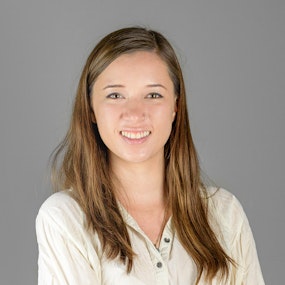
Steph Smith
Senior Manager / Head of Trends.co at HubSpot
Steph Smith is a growth marketer, writer, indie maker, and world-traveling digital nomad who was nominated for Maker of the Year at Product Hunt. She is also the Head of Trends.co at The Hustle - one of the largest newsletters in the world.
Steph loves writing about remote work, productivity, travel, women in tech, and learning to code on her blog, which has been read more than 500k+ times. She is also the host of the podcast, Sh*t You Don't Learn in School.


























